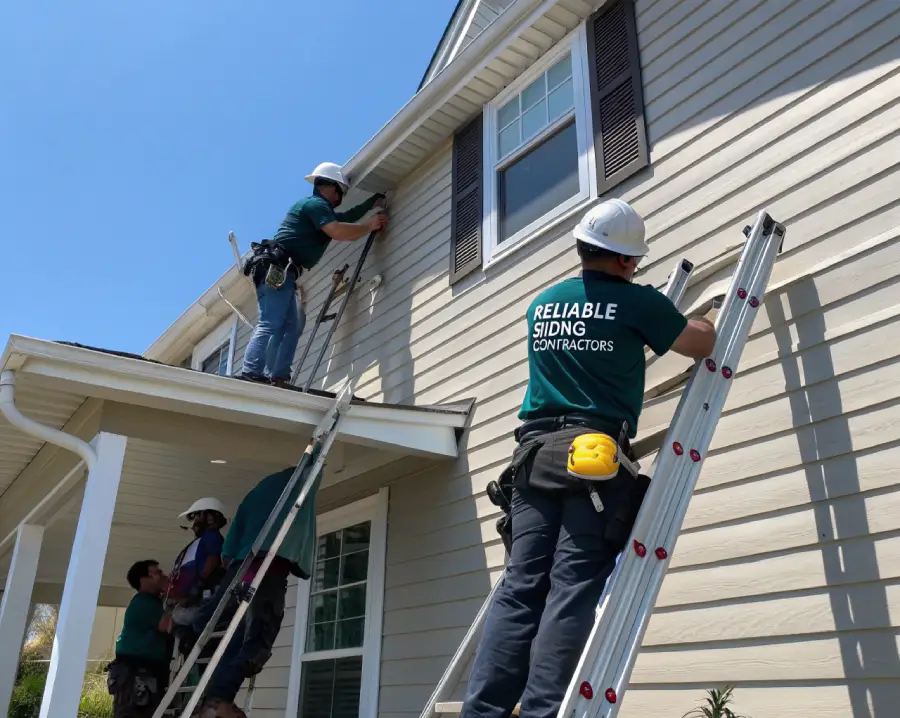Have you ever driven through a Toronto neighborhood and noticed how some homes shine with curb appeal while others look tired and worn? The secret often lies in the quality of the siding and the contractor who installed it. With Toronto’s mix of cold winters, humid summers, and sudden weather shifts, choosing the right siding contractors near you in Toronto isn’t just about aesthetics—it’s about protecting your home for decades to come.
The problem is, not all siding contractors are created equal. Some may offer low prices but cut corners, while others provide high-end results at a premium. So, how do you strike the balance between affordability, reliability, and long-term value?
That’s where this guide comes in. We’ll explore everything you need to know about finding trustworthy siding contractors in Toronto—covering reputation, costs, materials, warranties, and red flags to avoid. Keep reading to learn how to make the smartest decision for your home and your budget.
Why Siding Matters in Toronto
Toronto homeowners face unique challenges when it comes to exterior siding.
The Role of Siding in Home Protection
Siding isn’t just about looks—it’s your home’s first defense against rain, wind, snow, and pests. Properly installed siding reduces maintenance costs, boosts energy efficiency, and adds resale value.
Toronto’s Climate and Its Impact
- Harsh winters cause freeze-thaw cycles, leading to cracks in poorly installed siding.
- Humid summers can promote mold and mildew growth if siding isn’t weather-resistant.
- Strong winds from Lake Ontario can loosen panels without proper fastening.
This makes the choice of both material and contractor essential.
Looking for trusted siding contractors near you in Toronto to upgrade your home’s exterior?
What to Look for in Siding Contractors Near You in Toronto
Hiring the right professional can mean the difference between 20 years of worry-free protection and constant repairs.
1. Experience and Expertise
Look for contractors with at least 5–10 years of local experience. Toronto-specific knowledge ensures they understand building codes, weather challenges, and neighborhood aesthetics.
2. Licensing and Insurance
Reputable siding contractors must be:
- Licensed by the City of Toronto
- Insured with liability and workers’ compensation coverage
- Able to provide certifications upon request
3. Customer Reviews and Testimonials
Check Google Reviews, HomeStars, and Houzz. Look for consistent praise about timeliness, craftsmanship, and professionalism.
4. Material Options
A good contractor should offer:
- Vinyl siding (affordable, low maintenance)
- Fiber cement siding (durable, upscale appearance)
- Aluminum siding (lightweight, weather-resistant)
- Engineered wood siding (natural look, eco-friendly)
5. Warranty Coverage
Ask about:
- Manufacturer warranties (often 25–50 years)
- Contractor workmanship warranties (typically 5–10 years)
Comparing Siding Contractors: Cost and Value
Here’s a quick breakdown of average siding costs in Toronto:
| Siding Material | Average Cost (per sq. ft.) | Lifespan | Maintenance Level |
| Vinyl | $6 – $9 | 20–30 years | Low |
| Fiber Cement (James Hardie) | $10 – $14 | 40–50 years | Low-Medium |
| Aluminum | $7 – $10 | 30–40 years | Medium |
| Engineered Wood | $9 – $12 | 25–35 years | Medium |
💡 Pro Tip: Don’t just chase the lowest price. Instead, weigh initial investment vs. long-term performance. Fiber cement may cost more upfront but offers significantly better ROI.
Steps to Finding Reliable Siding Contractors Near You in Toronto
Step 1: Research and Shortlist
- Search “siding contractors near me Toronto” on Google.
- Compare ratings and services.
- Shortlist 3–5 companies.
Step 2: Request Multiple Quotes
Ask for itemized estimates including:
- Material costs
- Labor costs
- Warranty details
- Timeline for completion
Step 3: Check References and Past Work
Reputable contractors will happily provide addresses of past projects so you can see their work firsthand.
Step 4: Discuss Materials and Styles
Match siding type to your home’s architecture. For example:
- Modern homes: Fiber cement panels
- Traditional homes: Vinyl or wood look
- High-end homes: James Hardie siding
Step 5: Finalize with a Contract
Ensure the written contract includes:
- Detailed scope of work
- Payment schedule
- Warranty terms
Red Flags to Avoid When Hiring a Siding Contractor
- No written contract → Risk of hidden costs.
- Cash-only deals → Often indicate no insurance or license.
- Unusually low quotes → May suggest cutting corners or using substandard materials.
- Lack of local references → Could be out-of-town operators with no stake in community reputation.
Why Local Expertise Matters
Toronto’s housing market is diverse—from Victorian homes in Cabbagetown to modern condos downtown. Contractors with local experience understand neighborhood guidelines, HOA rules, and city permits. This saves you time and potential fines.
Conclusion
Finding the right siding contractors near you in Toronto doesn’t have to be overwhelming. By focusing on experience, customer reviews, material expertise, and transparent pricing, you’ll ensure your home gets the protection and beauty it deserves.
Ready to enhance your home’s curb appeal? Reach out to trusted siding contractors in Toronto today and secure a long-lasting, beautiful exterior.
FAQs About Siding Contractors in Toronto
How much does siding installation cost in Toronto?
On average, siding installation costs $6–$14 per square foot, depending on material and contractor.
2. Which siding material is best for Toronto’s climate?
Fiber cement siding and vinyl siding are most popular due to durability and weather resistance.
3. How do I know if my siding contractor is reliable?
Look for licenses, insurance, online reviews, and local references.
4. Do siding contractors in Toronto offer warranties?
Yes. Most offer 5–10 years workmanship warranty plus 25–50 years manufacturer warranty.
5. Can siding installation improve my home’s resale value?
Absolutely. Homes with new siding often see 70–80% ROI when sold.
6. How long does siding last in Toronto?
Depending on the material:
- Vinyl: 20–30 years
- Fiber cement: 40–50 years
- Aluminum: 30–40 years



